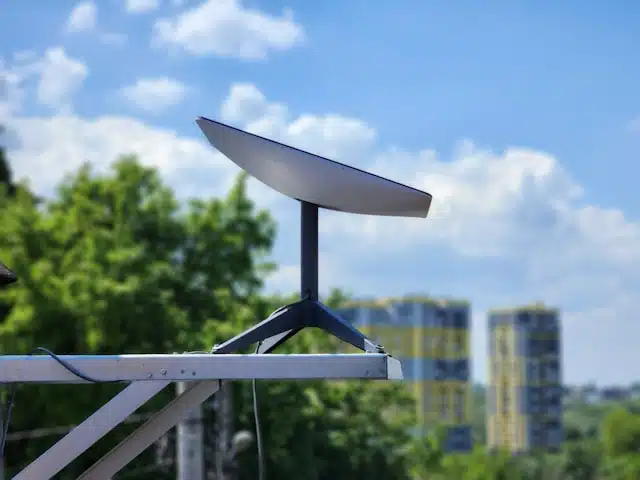Hola,
Victoria from Techpoint here,
Here’s what I’ve got for you today:
- No NIN, No credit: FG rolls out new policy
- Hello Tractor is turning equipment into shared wealth
- Starlink lights up Guinea-Bissau’s skies
No NIN, No credit: FG rolls out new policy

So, here’s the latest gist: The Nigerian government is changing the loan game, big time. From now on, your credit score will be tied directly to your NIN (that’s your National Identification Number, in case you forgot). And yes, it’s exactly what you’re thinking: defaulting on a loan might soon mess with your ability to renew your passport, get a driver’s licence, or even rent an apartment. Whew.
The brain behind this move is the Nigerian Consumer Credit Corporation (CREDICORP), led by Uzoma Nwagba. According to him, this is a “fundamental shift” aimed at fixing Nigeria’s shaky credit system. They’re trying to make credit scores more accurate, improve access to loans, and introduce real consequences for not paying up. It’s basically saying, “If you borrow, you better pay.”
Now, while this may sound like a step toward financial discipline, not everyone’s clapping. People are asking tough questions: “Will the same energy be used on corrupt officials and big corporates who vanish with billions?” Because if it only targets regular folks struggling with ₦20k loans, that’s not reform; that could be harassment.
CREDICORP says it won’t be too harsh. The rollout will be “subtle and structured.” They’re also launching a consumer credit programme for 400,000 youths, especially National Youth Service Corps (NYSC) members, helping people access loans for real needs like starting businesses or boosting productivity. That’s the promise, anyway.
But come on, Nigerians are not new to vibes and inshallah policies. With inflation choking and joblessness still high, many are wondering: is this really the best time? Social media, of course, went wild. Some praised the idea for encouraging responsibility. Others? Not so much. One person summed it up: “Nigeria is technologically advanced… except when it’s time to upload election results.”
So yeah, it could work, if done right. But if it turns into yet another stressor for everyday people while the real debt-dodgers in high places stay untouched, it’s just another headache dressed in digital clothes. Let’s hope this one delivers on its promises.

Victoria Fakiya – Senior Writer
Techpoint Digest
Stop struggling to find your tech career path
Discover in-demand tech skills and build a standout portfolio in this FREE 5-day email course
Hello Tractor is turning equipment into shared wealth

Smallholder farmers grow most of the food we eat in Africa, but they’re still stuck using hoes and cutlasses in the 21st century. Across sub-Saharan Africa, 33 million small-scale farmers produce 80% of our food, yet we import billions of dollars worth of food every year. The truth? Farming in Africa is still too hard and not nearly productive enough. That’s the problem Hello Tractor has been trying to fix since 2014.
Dubbed the “Uber for Tractors,” Hello Tractor is making it easier for farmers to get access to tractors without owning one. Most farmers can’t afford to buy a tractor, and most tractor owners don’t know how to find farmers who need them. So, Hello Tractor built a booking platform that links both sides. Farmers either call a support line or, more often, work with trusted booking agents in their communities to schedule tractor services.
Booking agents are a smart fix. These are locals who know the farmers, speak their language, and help them get tractor services without dealing with complicated tech. Once a booking is made, a nearby tractor operator is dispatched with all the info they need: location, farm size, and service date. It’s seamless and takes away the stress farmers usually face.
But it doesn’t end there. Hello Tractor also installs tracking devices on tractors, so owners can monitor location, fuel use, and operating hours through an app. It’s a way to build trust in the system and make sure the tractors are being used properly, especially important when you’re financing equipment or renting it out.
Farming doesn’t have to be this hard, and companies like Hello Tractor are proving that. With better tech and smarter systems, Africa’s food security challenge might just become an opportunity. For more on how Hello Tractor is changing the face of agriculture in Africa, read Sarah’s full story on Techpoint Africa.
Starlink lights up Guinea-Bissau’s skies

Yesterday, we talked about Starlink-South-Africa unending drama. Well, today, we’re talking about Starlink showing no signs of slowing down in Africa.
I mean, SpaceX has launched Starlink in Guinea-Bissau. Yeah, that small West African country where nearly 70% of the population had zero Internet access just joined the satellite Internet party.
Starlink dropped the update via its X account earlier today, showing a new coverage map with wide reach across Guinea-Bissau, from Bissau to Gabú to Buba. This comes barely a week after launching in the DRC and pushes Starlink’s African footprint to 23 countries. That’s including big names like Nigeria, Kenya, Egypt, and now, tiny but mighty Guinea-Bissau.
Back in December 2024, the country granted Starlink a provisional licence. Now, the service is live, offering up to 150 Mbps in places that previously had none. It’s a big deal, especially when you realise that slow or no Internet in places like Guinea-Bissau has stifled education, healthcare, and economic activity for years.
With over 6 million subscribers globally and 6,000+ satellites orbiting the Earth, Starlink isn’t playing small. They’ve just added 28 more satellites to the mix, and they’re already in talks with 10 more African countries. If those go through, over 60% of Africa could be covered. Wild, right?
But it’s not all smooth sailing. Some countries, like South Africa, are still not letting them in, mostly because of local ownership rules [looking at you, 30% Broad-Based Black Economic Empowerment (BEE requirements)]. Others are worried about security, data control, or how Starlink’s pricing might exclude the poorest citizens. At $599 for the kit and $50/month subscription, it’s not exactly cheap.
Still, Starlink’s expansion is shifting the Internet game in Africa, providing endless possibilities, from e-learning to digital healthcare. If you ask me, the future’s not just coming. It’s being beamed down from space.
In case you missed it
- Tesla has launched its first African office in Casablanca
What I’m watching and reading
- How The Polio Vaccine Destroyed Trust In Healthcare
- Will Any Progressive Men Go Traditional? | Middle Ground
Opportunities
- Want to exhibit or attend the Lagos Startup Expo today, Thursday, June 19, 2025? Visit this website here.
- Building a startup can feel isolating, but with Equity Merchants CommunityConnect, you can network with fellow founders, experts, and investors, gaining valuable insights and exclusive resources to help you grow your business. Click here to join.
- Help us make Techpoint better for you! Your feedback shapes what comes next (your responses may potentially save my job. A bit dramatic, but still). It will only take 30 seconds to tell us what works and what doesn’t. Fill it here.
- To pitch your startup or product to a live audience, check out this link.
- Have any fresh products you’d like us to start selling? Check out this link here.
- Follow Techpoint Africa’s WhatsApp channel to stay on top of the latest trends and news in the African tech space here.
Have a superb Thursday!
Victoria Fakiya for Techpoint Africa.










